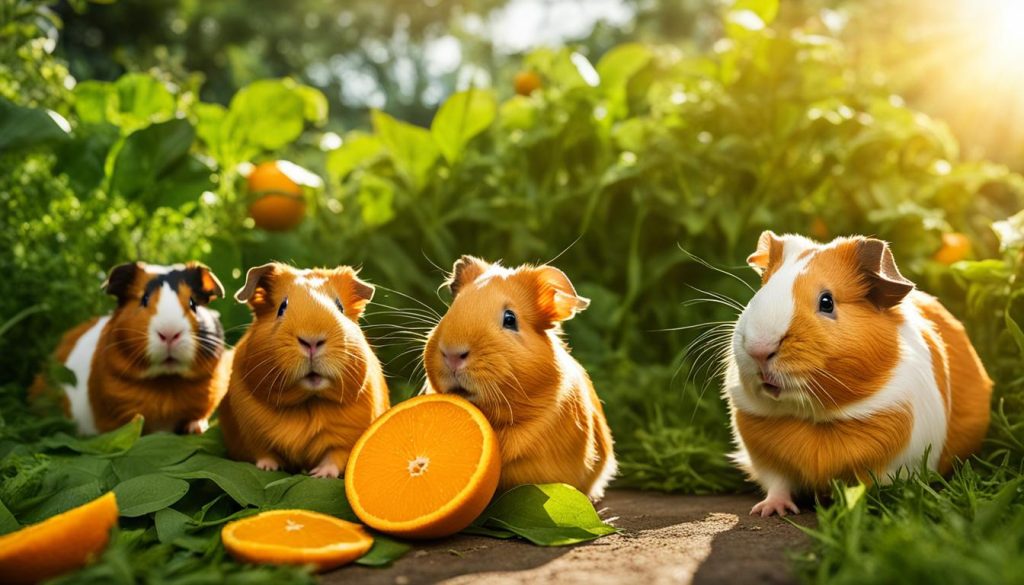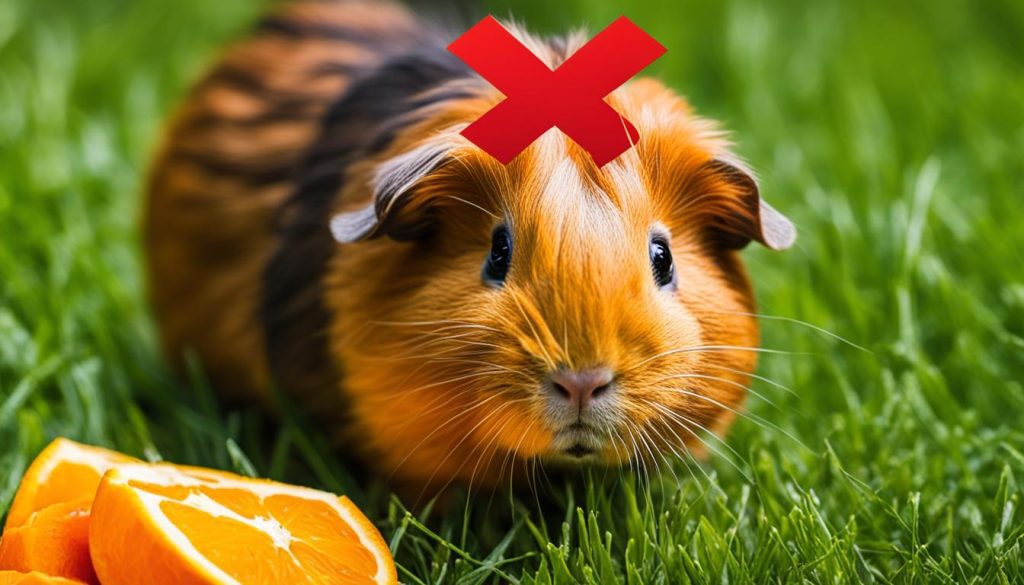As a guinea pig owner, you may wonder if it’s safe to give your furry friend oranges. The good news is, guinea pigs can indeed eat oranges, but there are a few important considerations to keep in mind. In this article, I will discuss the nutritional value of oranges for guinea pigs, how to feed them safely, and other important factors to consider when incorporating oranges into your guinea pig’s diet.
Can Guinea Pigs Eat Oranges? The sweet answer is yes, they can!
- Guinea pigs can eat oranges in moderation, but it’s important to exercise caution.
- Oranges are an excellent source of Vitamin C, which is crucial for guinea pig health.
- Adult guinea pigs need around 10 to 30 milligrams of dietary Vitamin C per kilogram of body weight daily.
- Too much Vitamin C can lead to kidney and bladder stones, poor growth, and arthritis.
- Safe sources of Vitamin C for guinea pigs include other fruits and vegetables as well as commercial supplements formulated specifically for guinea pigs.
The Benefits of Oranges for Guinea Pigs
Oranges provide not only Vitamin C but also fiber and calcium, making them a valuable addition to a guinea pig’s diet. Vitamin C plays a crucial role in boosting immunity and protecting against free radicals, while calcium ensures strong bones and proper functioning of the heart, muscles, and nerves.
By including oranges in your guinea pig’s diet, you can help prevent scurvy, a condition that can lead to various health issues such as tooth grinding, joint pain, and weight loss. Oranges are a natural source of Vitamin C, eliminating the need for supplements.
However, it’s essential to remember that oranges contain high levels of sugar. To avoid potential dental problems, weight gain, and digestive issues, it is recommended to offer only a few bites of orange a few times a week. Moderation is key to ensuring your guinea pig’s overall health and well-being.
When feeding oranges to your guinea pig, be sure to remove any pips or seeds as they can present a choking hazard. While orange peels can be safely consumed, they should be thoroughly washed to eliminate any residue of pesticides that may be present.

Providing your guinea pig with the benefits of oranges, such as Vitamin C, fiber, and calcium, can help maintain its optimal health. Remember to offer oranges in moderation and always prioritize a balanced diet filled with fresh vegetables, hay, and high-quality guinea pig pellets. By following these guidelines, you can ensure that your guinea pig enjoys the nutritional benefits of oranges while avoiding any potential risks that may arise from overconsumption.
How to Feed Oranges to Guinea Pigs Safely
When it comes to feeding oranges to guinea pigs, it’s crucial to do so in a cautious and controlled manner. The key is to provide oranges sparingly and adhere to safe practices to ensure the well-being of your furry friends.
The serving size for oranges should be about the size of your thumb or one regular wedge of the fruit. This portion size ensures that your guinea pig receives the necessary Vitamin C without overindulging. Before offering the fruit to your guinea pig, make sure to remove any seeds or pips that could pose a choking hazard.
Orange peels can also be given to guinea pigs, as they provide additional nutrients. However, it’s essential to wash the peels thoroughly to eliminate any pesticide residue that could be harmful to your pets. By taking this extra step, you can ensure that the orange peels are safe for consumption.
To maintain a balanced diet for your guinea pigs, it is recommended to feed them oranges only once or twice a week. By limiting the frequency, you minimize the risk of digestive issues and weight gain. Remember, moderation is key.
When selecting oranges for your guinea pigs, opt for fresh and ripe organic varieties. Canned oranges should be avoided, as they often contain added sugars, acids, and preservatives that can be harmful to guinea pigs. In this case, fresh is always best.
It’s important to note that guinea pigs should not drink orange juice or consume other highly acidic citrus fruits like lemons. These fruits can cause mouth sores and digestive problems in guinea pigs, which may lead to discomfort and health issues.
By following these guidelines, you can safely incorporate oranges into your guinea pigs’ diet and provide them with the necessary Vitamin C and other beneficial nutrients. Remember, always prioritize your guinea pigs’ health and well-being when considering their dietary needs.
What Guinea Pigs Should Not Eat
While oranges can be a safe and beneficial addition to a guinea pig’s diet when given in moderation, it’s important to be aware of other foods that guinea pigs should avoid. These include potatoes, garlic, chives, avocado, grapes, raisins, onion, rhubarb, coconut, “human food,” commercial food for other animals, grass clippings, meat, dairy products, dried fruit, nuts, and seeds.
It’s also crucial to be mindful of the types of flowers and plants that can be toxic to guinea pigs. Some common examples include daffodils, tulips, lilies, and azaleas. It’s best to research the specific plants in your guinea pig’s environment and remove any that may pose a danger.
When it comes to a guinea pig’s diet, the primary components should be fresh hay, high-quality guinea pig nuggets, and a variety of vegetables and leafy greens. These provide the necessary nutrients and fiber to keep guinea pigs healthy and happy.
Treats should be given only occasionally and in small quantities. While oranges can be offered as a treat, it’s important to remember that they should be given sparingly due to their high sugar content.

Conclusion
Guinea pigs can safely enjoy oranges as part of their diet, but certain precautions should be taken. Oranges are rich in essential nutrients such as Vitamin C, fiber, and calcium, which contribute to the overall health and well-being of guinea pigs. However, due to their high sugar content, it is important to offer oranges in moderation to prevent potential dental issues, weight gain, and digestive problems.
When feeding oranges to guinea pigs, it is crucial to remove any seeds or pips, as they can pose a choking hazard. Additionally, the orange peel should be thoroughly washed to eliminate any pesticide traces. It is advised to avoid feeding guinea pigs other citrus fruits such as lemons, grapefruits, and limes due to their high acidity.
Incorporating oranges into a guinea pig’s diet can provide them with a tasty and nutritious treat. However, it is essential to remember that oranges should not be the primary component of their diet. Fresh hay, high-quality guinea pig nuggets, and a variety of vegetables and leafy greens should still form the majority of their daily intake.
FAQ
Can guinea pigs eat oranges?
Yes, guinea pigs can eat oranges, but it should be done sparingly and with caution.
What is the nutritional value of oranges for guinea pigs?
Oranges are an excellent source of Vitamin C, fiber, and calcium, which are essential for guinea pigs’ overall health.
How much orange should I feed my guinea pig?
It’s recommended to offer a few bites of fresh and ripe organic oranges once or twice a week. The serving size should be about the size of your thumb or one regular wedge of the fruit. Remove any seeds or pips before feeding.
Are oranges safe for guinea pigs?
Oranges are safe for guinea pigs when given in moderation. However, due to their high sugar content, it’s important to limit the amount and frequency of orange consumption to prevent dental problems, weight gain, and digestive issues.
Can guinea pigs eat orange peels?
Yes, guinea pigs can safely consume orange peels. However, it’s crucial to thoroughly wash the peels to remove any pesticide traces before offering them to your guinea pigs.
What other fruits and vegetables are safe for guinea pigs?
Safe sources of Vitamin C for guinea pigs include tomatoes, bell peppers, spinach, and strawberries. Other safe fruits and vegetables include cucumbers, carrots, celery, and leafy greens like kale and lettuce.
Can guinea pigs eat citrus fruits besides oranges?
Guinea pigs should not consume highly acidic citrus fruits like lemons, grapefruits, or limes. These fruits can cause mouth sores and digestive problems.
What foods should guinea pigs avoid?
Guinea pigs should avoid foods such as potatoes, garlic, chives, avocado, grapes, raisins, onion, rhubarb, coconut, “human food,” commercial food for other animals, grass clippings, meat, dairy products, dried fruit, nuts, and seeds.
What should be the primary components of a guinea pig’s diet?
The primary components of a guinea pig’s diet should be fresh hay, high-quality guinea pig nuggets, and a variety of vegetables and leafy greens. Treats should be given occasionally and in small quantities.






